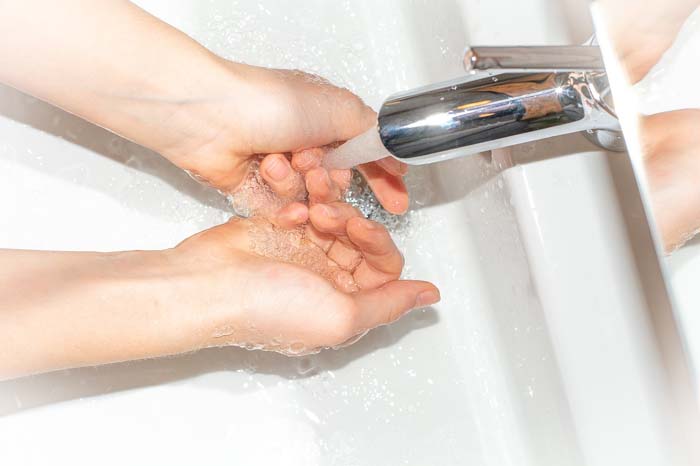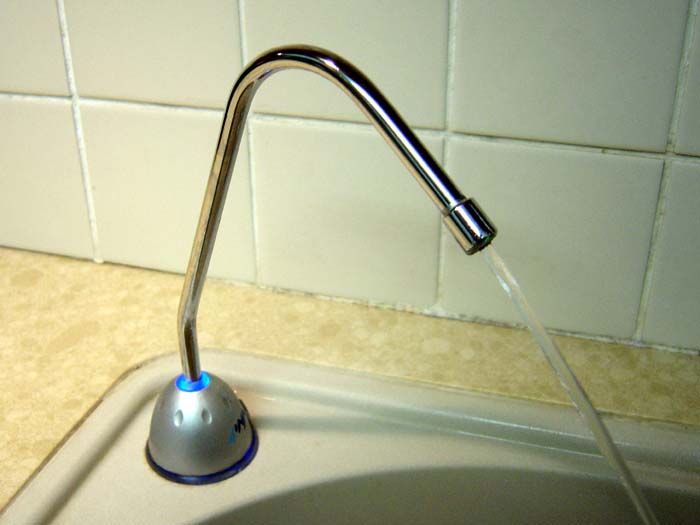
The water from a standard home sink is usually safe to drink and use for other household tasks, including washing, cleaning, and cooking. It is important to remember that sink water quality can change based on where it comes from, the pipes it flows through, and the treatments it receives.
Using a water filter to eliminate contaminants or getting your water tested to make sure it’s safe are two options to consider if you’re worried about the water quality in your sink. Another way to help keep this precious resource around for future generations is to be careful with how much water you consume and develop water conservation habits.
Here’s the best way to filter sink water:
You should filter your sink water before drinking it. Not only will it remove contaminants, but it will also improve the water’s taste. Some common approaches are as follows:
- Gravity Filters
Activated carbon, or ceramic, is the filtration medium in these filters, and gravity draws water through them. Their efficiency in filtering out various pollutants depends on the filter’s quality, but they’re easy to use.
- Reverse Osmosis Systems
Use a reverse osmosis (RO) system to filter out harmful substances, including bacteria, salt, and heavy metals. Although they produce extremely pure water, they might be more costly and water-wasting than other options.
- Ion Exchange Filters
These filters exchange ions bound to resin or other media with water ions. While they work wonders for removing hardness-causing minerals like magnesium and calcium, they could leave behind other impurities.
- Ceramic Filters
Physically blocking pollutants, these filters take advantage of tiny pores. Although they are efficient against certain chemicals and germs, viruses and dissolved compounds may evade their removal.
- Distillation
The distillation process involves boiling water and re-condensing the steam. Even though it’s energy-intensive and misses some volatile organic compounds, it successfully removes most pollutants, including microorganisms and heavy metals.
- Activated carbon filters
Among other chemicals, these are great at getting rid of chlorine and volatile organic compounds (VOCs). Plus, they have the ability to enhance both flavor and aroma.
- UV Water Purifiers
UV radiation can eradicate various microbes, including viruses and bacteria, by destroying the DNA molecule. It frequently works with other filtration processes for a more thorough purification.
Do sink water purifiers really work?
Indeed, installing a water purifier in the sink can effectively clean tap water. A sink water purifier’s filtration method and technology determine its effectiveness.
UV filters, RO systems, and activated carbon are among sinks’ most popular water purifiers. Chlorine, silt, heavy metals, germs, and viruses are just some of the toxins that these technologies aim to eliminate.
Activated carbon filters can successfully remove chlorine, silt, VOCs, and even some heavy metals. Reverse osmosis systems excel at removing various impurities, including dissolved solids, heavy metals, germs, viruses, and more. One water filtration method uses ultraviolet radiation, which kills bacteria, viruses, and other microbes.
Before purchasing a sink water purifier, consider your water filtration requirements, the frequency of your system’s maintenance, and the local water quality. To keep the purifier running well, changing the filters regularly and following the manufacturer’s maintenance and operating instructions are important.
 How long does under sink water filter last?
How long does under sink water filter last?
How long an under-sink water filter lasts depends on several factors, including the filter type, the water quality, and the amount of water flowing through it. A good rule of thumb is that most under-sink water filters only last about six months to two years. However, you must change the filter according to the manufacturer’s instructions to maintain peak performance and water quality. Indicators or monitoring systems can alert you when it’s time to replace your filter. If you want your filter to keep removing impurities and providing clean water, you must replace and maintain it frequently.
Natural ways to purify sink water
You can purify your sink water naturally in several ways, but keep in mind that some of these procedures might not eliminate all the toxins. Some all-natural methods for cleaning up your sink:
Aeration
You can enhance the flavor and reduce the presence of volatile organic compounds (VOCs) in water by letting it sit in an open container for a while.
Filtration
In a filtering system, the use of activated carbon filters is critical. With the help of these filters, you can improve the water’s flavor and aroma by removing contaminants like chlorine, sediment, and even some chemicals.
Clay Pots
Clay pots can naturally filter out impurities in water. Clay containers allow water to filter out contaminants and develop a more pleasant flavor over time.
Solar Disinfection
Place six hours of water in see-through PET bottles and set them out in direct sunlight. The water will be safer because the sun’s UV rays eliminate germs.
Activated Charcoal
A very porous substance, activated charcoal (or activated carbon), may efficiently absorb pollutants and other water impurities. Activated charcoal and a water-permeable container are all you need to construct a basic filter.
Distillation
Even though it’s not completely natural, distillation removes contaminants from water by boiling it and collecting the vapor, just like in the natural water cycle. Although it takes more equipment, this approach can create extremely pure water.
Boiling
Boiling water is a traditional and reliable method of disinfecting against germs and viruses. For optimal purification, boil the water for a minimum of one minute.
Boiling with Herbs
Herbs with inherent antimicrobial qualities include cilantro, mint, and basil. These herbs may enhance flavor and kill microorganisms when added to boiling water.
Always keep in mind that these solutions can only do so much to improve water quality. Consider purchasing a certified water filtration system or conducting routine water quality tests to ensure consistently safe drinking water, particularly in areas where pollutants are known to be in the tap water.
Benefits of Filtering Sink Water
There are numerous advantages to filtering sink water:
- Convenience
Having filtered water available at home may save the hassle of purchasing and transporting bottled water. It allows you to enjoy clean and pleasant drinking water at any time.
- Better smell and taste
Filtered water has many advantages over untreated tap water, including a more pleasant aroma and flavor. Filtering can eliminate chlorine, sulfur, and other chemicals that impart disagreeable flavors and smells.
- Environmental advantages
One way to lessen the environmental impact of plastic waste is to filter water from the faucet instead of buying single-use plastic bottles.
- Safer Water for Human Consumption
Filtered water is a better choice for hydration since it removes pollutants and other impurities. Drinking clean water is critical in order to stay hydrated and support one’s body’s processes.
- Protection against dangerous substances
Tap water can contain toxins such as lead, arsenic, and pharmaceutical residues. Chronic consumption of these contaminants can be very harmful to your health. Using a filter to eliminate or reduce their levels can further protect you and your family from these toxins.
- Cost savings
Over time, tap water filtering with a water filter is usually cheaper than bottled water. Compared to purchasing bottled water regularly, investing in a high-quality water filtration system or using filter pitchers can save long-term costs.
- Removing pollutants
Many contaminants exist in tap water, such as heavy metals, microorganisms, pesticides, heavy metals, and microplastics. The water is safer and healthier to drink when filtration gets rid of or reduces these contaminants.
- Decrease of chloramine and chlorine
Public water systems frequently employ chlorine and chloramine for disinfection, but they have the potential to leave a noticeable flavor and smell in drinking water. You can enhance the water’s taste and drinkability by reducing these contaminants through filtration.
Filtering water from a sink offers a multitude of benefits, not only for one’s health but also for the preservation of the environment. This is why it is a popular option for most homes.
Conclusion
Consider your needs, budget, and how convenient it is to use a filtration system before settling on a filtration system. Filters must be serviced and replaced on a regular basis, as directed by the manufacturer, to keep them working properly.
